Deck 3: Differentiation
Question
Question
Question
Question
Question
Question
Question
Question
Question
Question
Question
Question
Question
Question
Question
Question
Question
Question
Question
Question
Question
Question
Question
Question
Question
Question
Question
Question
Question
Question
Question
Question
Question
Question
Question
Question
Question
Question
Question
Question
Question
Question
Question
Question
Question
Question
Question
Question
Question
Question
Question
Question
Question
Question
Question
Question
Question
Question
Question
Question
Question
Question
Question
Question
Question
Question
Question
Question
Question
Question
Question
Question
Question
Question
Question
Question
Question
Question
Question
Question

Unlock Deck
Sign up to unlock the cards in this deck!
Unlock Deck
Unlock Deck
1/193
Play
Full screen (f)
Deck 3: Differentiation
1
Use implicit differentiation to find  .
. 
A)
B)
C)
D)
E)
 .
. 
A)

B)

C)

D)

E)

A
2
Approximate the zero(s) of the function. Use Newton's Method and continue the process until two successive approximations differ by less than 0.001. Round your answer to 5 decimal places.  ,
, 
A) 0.86641
B) 0.89724
C) 0.86547
D) 1.07000
 ,
, 
A) 0.86641
B) 0.89724
C) 0.86547
D) 1.07000
C
3
A point is moving along the graph of the function  such that
such that  centimeters per second. Find
centimeters per second. Find  when
when  .
.
A)
B)
C)
D)
E)
 such that
such that  centimeters per second. Find
centimeters per second. Find  when
when  .
. A)

B)

C)

D)

E)

E
4
Find  at the point
at the point  for the equation
for the equation  .
.
A)
B)
C)
D)
E)
 at the point
at the point  for the equation
for the equation  .
. A)

B)

C)

D)

E)


Unlock Deck
Unlock for access to all 193 flashcards in this deck.
Unlock Deck
k this deck
5
Find  if
if  .
.
A)
B)
C)
D)
E)
 if
if  .
. A)

B)

C)

D)

E)


Unlock Deck
Unlock for access to all 193 flashcards in this deck.
Unlock Deck
k this deck
6
Suppose the position function for a free-falling object on a certain planet is given by  . A silver coin is dropped from the top of a building that is 1,378 feet tall. Find velocity of the coin at impact. Round your answer to the three decimal places.
. A silver coin is dropped from the top of a building that is 1,378 feet tall. Find velocity of the coin at impact. Round your answer to the three decimal places.
A) -257.185 ft/sec
B) -123.118 ft/sec
C) -111.364 ft/sec
D) -246.236 ft/sec
E) -235.236 ft/sec
 . A silver coin is dropped from the top of a building that is 1,378 feet tall. Find velocity of the coin at impact. Round your answer to the three decimal places.
. A silver coin is dropped from the top of a building that is 1,378 feet tall. Find velocity of the coin at impact. Round your answer to the three decimal places. A) -257.185 ft/sec
B) -123.118 ft/sec
C) -111.364 ft/sec
D) -246.236 ft/sec
E) -235.236 ft/sec

Unlock Deck
Unlock for access to all 193 flashcards in this deck.
Unlock Deck
k this deck
7
Find the slope of the graph of the function at the given value.  when
when 
A)
B)
C)
D)
E)
 when
when 
A)

B)

C)

D)

E)


Unlock Deck
Unlock for access to all 193 flashcards in this deck.
Unlock Deck
k this deck
8
Find the derivative of the function  .
.
A)
B)
C)
D)
E)
 .
. A)

B)

C)

D)

E)


Unlock Deck
Unlock for access to all 193 flashcards in this deck.
Unlock Deck
k this deck
9
Find the derivative of the function  by the limit process.
by the limit process.
A)
B)
C)
D)
E)
 by the limit process.
by the limit process. A)

B)

C)

D)

E)


Unlock Deck
Unlock for access to all 193 flashcards in this deck.
Unlock Deck
k this deck
10
Find the derivative of the function  by the limit process.
by the limit process.
A)
B)
C)
D)
E)
 by the limit process.
by the limit process. A)

B)

C)

D)

E)


Unlock Deck
Unlock for access to all 193 flashcards in this deck.
Unlock Deck
k this deck
11
Find the slope of the tangent line  at the given point
at the given point  . Round your answer to two decimal places.
. Round your answer to two decimal places.
A) 0.67
B) 2.00
C) 1.00
D) 1.67
E) 3.00
 at the given point
at the given point  . Round your answer to two decimal places.
. Round your answer to two decimal places. A) 0.67
B) 2.00
C) 1.00
D) 1.67
E) 3.00

Unlock Deck
Unlock for access to all 193 flashcards in this deck.
Unlock Deck
k this deck
12
A ball is thrown straight down from the top of a 220-ft building with an initial velocity of -16 ft per second. The position function is  . What is the velocity of the ball after 4 seconds?
. What is the velocity of the ball after 4 seconds?
A) The velocity after 4 seconds is -80 ft per second.
B) The velocity after 4 seconds is -112 ft per second.
C) The velocity after 4 seconds is -144 ft per second.
D) The velocity after 4 seconds is -48 ft per second.
E) The velocity after 4 seconds is -288 ft per second.
 . What is the velocity of the ball after 4 seconds?
. What is the velocity of the ball after 4 seconds? A) The velocity after 4 seconds is -80 ft per second.
B) The velocity after 4 seconds is -112 ft per second.
C) The velocity after 4 seconds is -144 ft per second.
D) The velocity after 4 seconds is -48 ft per second.
E) The velocity after 4 seconds is -288 ft per second.

Unlock Deck
Unlock for access to all 193 flashcards in this deck.
Unlock Deck
k this deck
13
Assume that x and y are both differentiable functions of t. Find  when
when  and
and  for the equation
for the equation  .
.
A)
B)
C)
D)
E)
 when
when  and
and  for the equation
for the equation  .
. A)

B)

C)

D)

E)


Unlock Deck
Unlock for access to all 193 flashcards in this deck.
Unlock Deck
k this deck
14
Find the slope of the graph of the function at the given value.  when
when 
A)
B)
C)
D)
E)
 when
when 
A)

B)

C)

D)

E)


Unlock Deck
Unlock for access to all 193 flashcards in this deck.
Unlock Deck
k this deck
15
Find an equation to the tangent line to the graph of the function  at the point
at the point  . The coefficients below are given to two decimal places.
. The coefficients below are given to two decimal places.
A)
B)
C)
D)
E)
 at the point
at the point  . The coefficients below are given to two decimal places.
. The coefficients below are given to two decimal places. A)

B)

C)

D)

E)


Unlock Deck
Unlock for access to all 193 flashcards in this deck.
Unlock Deck
k this deck
16
Use Newton's Method to approximate the zero(s) of the function  accurate to three decimal places.
accurate to three decimal places.
A) -0.493
B) 0.451
C) -0.546
D) 0.493
E) -0.444
 accurate to three decimal places.
accurate to three decimal places. A) -0.493
B) 0.451
C) -0.546
D) 0.493
E) -0.444

Unlock Deck
Unlock for access to all 193 flashcards in this deck.
Unlock Deck
k this deck
17
Find  in terms of x and y.
in terms of x and y. 
A)
B)
C)
D)
E)
 in terms of x and y.
in terms of x and y. 
A)

B)

C)

D)

E)


Unlock Deck
Unlock for access to all 193 flashcards in this deck.
Unlock Deck
k this deck
18
In a free-fall experiment, an object is dropped from a height of 256 feet. A camera on the ground 500 feet from the point of impact records the fall of the object as shown in the figure. Assuming the object is released at time  . At what time will the object reach the ground level?
. At what time will the object reach the ground level? 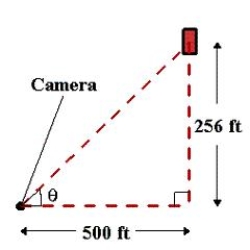
A) 3 seconds
B) 6 seconds
C) 7 seconds
D) 5 seconds
E) 4 seconds
 . At what time will the object reach the ground level?
. At what time will the object reach the ground level? 
A) 3 seconds
B) 6 seconds
C) 7 seconds
D) 5 seconds
E) 4 seconds

Unlock Deck
Unlock for access to all 193 flashcards in this deck.
Unlock Deck
k this deck
19
Use the Quotient Rule to differentiate the function  .
.
A)
B)
C)
D)
E)
 .
. A)

B)

C)

D)

E)


Unlock Deck
Unlock for access to all 193 flashcards in this deck.
Unlock Deck
k this deck
20
Evaluate the derivative of the function at the given point.  ,
, 
A)
B)
C)
D)
E)
 ,
, 
A)

B)

C)

D)

E)


Unlock Deck
Unlock for access to all 193 flashcards in this deck.
Unlock Deck
k this deck
21
A man 6 feet tall walks at a rate of 10 feet per second away from a light that is 15 feet above the ground (see figure). When he is 13 feet from the base of the light, at what rate is the tip of his shadow moving? 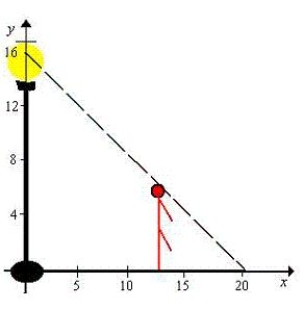
A)
B)
C)
D)
E)

A)

B)

C)

D)

E)


Unlock Deck
Unlock for access to all 193 flashcards in this deck.
Unlock Deck
k this deck
22
Given the derivative below find the requested higher-order derivative.  ,
,  .
.
A)
B)
C)
D)
E)
 ,
,  .
.
A)

B)

C)

D)

E)


Unlock Deck
Unlock for access to all 193 flashcards in this deck.
Unlock Deck
k this deck
23
Apply Newton's Method to approximate the x-value of the indicated point of intersection of  and
and  . Continue the process until two successive approximations differ by less than 0.001.
. Continue the process until two successive approximations differ by less than 0.001.
 and
and  . Continue the process until two successive approximations differ by less than 0.001.
. Continue the process until two successive approximations differ by less than 0.001.
Unlock Deck
Unlock for access to all 193 flashcards in this deck.
Unlock Deck
k this deck
24
Find the derivative of the function  .
.
A)
B)
C)
D)
E)
 .
. A)

B)

C)

D)

E)


Unlock Deck
Unlock for access to all 193 flashcards in this deck.
Unlock Deck
k this deck
25
Find the derivative of the trigonometric function  .
.
A)
B)
C)
D)
E)
 .
. A)

B)

C)

D)

E)


Unlock Deck
Unlock for access to all 193 flashcards in this deck.
Unlock Deck
k this deck
26
Use Newton's Method to approximate the zero(s) of the function  accurate to three decimal places.
accurate to three decimal places.
A) 0.250
B) -0.250
C) -0.292
D) 0.281
E) 0.197
 accurate to three decimal places.
accurate to three decimal places. A) 0.250
B) -0.250
C) -0.292
D) 0.281
E) 0.197

Unlock Deck
Unlock for access to all 193 flashcards in this deck.
Unlock Deck
k this deck
27
Find  in terms of x and y given that
in terms of x and y given that  . Use the original equation to simplify your answer.
. Use the original equation to simplify your answer.
A)
B)
C)
D)
E)
 in terms of x and y given that
in terms of x and y given that  . Use the original equation to simplify your answer.
. Use the original equation to simplify your answer. A)

B)

C)

D)

E)


Unlock Deck
Unlock for access to all 193 flashcards in this deck.
Unlock Deck
k this deck
28
Approximate the positive zero(s) of the function  to three decimal places. Use Newton's Method and continue the process until two successive approximations differ by less than 0.001.
to three decimal places. Use Newton's Method and continue the process until two successive approximations differ by less than 0.001.
A) -1.207
B) 1.105
C) 1.082
D) -1.105
E) 1.156
 to three decimal places. Use Newton's Method and continue the process until two successive approximations differ by less than 0.001.
to three decimal places. Use Newton's Method and continue the process until two successive approximations differ by less than 0.001. A) -1.207
B) 1.105
C) 1.082
D) -1.105
E) 1.156

Unlock Deck
Unlock for access to all 193 flashcards in this deck.
Unlock Deck
k this deck
29
A man 6 feet tall walks at a rate of 13 feet per second away from a light that is 15 feet above the ground (see figure). When he is 5 feet from the base of the light, at what rate is the length of his shadow changing? 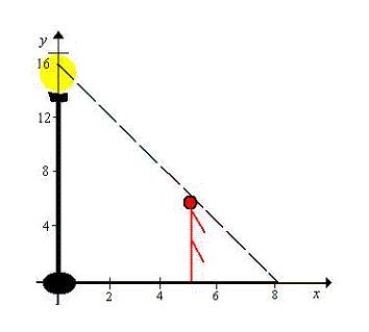
A)
B)
C)
D)
E)

A)

B)

C)

D)

E)


Unlock Deck
Unlock for access to all 193 flashcards in this deck.
Unlock Deck
k this deck
30
Find the derivative of the function  .
.
A)
B)
C)
D)
E)
 .
. A)

B)

C)

D)

E)


Unlock Deck
Unlock for access to all 193 flashcards in this deck.
Unlock Deck
k this deck
31
Differentiate the function  .
.
A)
B)
C)
D)
E)
 .
. A)

B)

C)

D)

E)


Unlock Deck
Unlock for access to all 193 flashcards in this deck.
Unlock Deck
k this deck
32
Find an equation of the tangent line to the graph of the function  at the point
at the point  .
.
A)
B)
C)
D)
E)
 at the point
at the point  .
. A)

B)

C)

D)

E)


Unlock Deck
Unlock for access to all 193 flashcards in this deck.
Unlock Deck
k this deck
33
Use the general rule to approximate  and
and  to three decimal places.
to three decimal places.  ,
, 
A) 1.73749, 1.61401
B) 1.65922, 1.99377
C) 1.28355, 1.44311
D) 1.56530, 1.89883
 and
and  to three decimal places.
to three decimal places.  ,
, 
A) 1.73749, 1.61401
B) 1.65922, 1.99377
C) 1.28355, 1.44311
D) 1.56530, 1.89883

Unlock Deck
Unlock for access to all 193 flashcards in this deck.
Unlock Deck
k this deck
34
Find an equation of the line that is tangent to the graph of the function  and parallel to the line
and parallel to the line  .
.
A)
B)
C)
D)
E)
 and parallel to the line
and parallel to the line  .
. A)

B)

C)

D)

E)


Unlock Deck
Unlock for access to all 193 flashcards in this deck.
Unlock Deck
k this deck
35
Evaluate the derivative of the function  at the point
at the point  .
.
A)
B)
C)
D)
E)
 at the point
at the point  .
. A)

B)

C)

D)

E)


Unlock Deck
Unlock for access to all 193 flashcards in this deck.
Unlock Deck
k this deck
36
Suppose that the total number of arrests T (in thousands) for all males ages 14 to 27 in 2006 is approximated by the model  ,
,  where x is the age in years (see figure). Approximate the two ages to one decimal place that had total arrests of 275 thousand.
where x is the age in years (see figure). Approximate the two ages to one decimal place that had total arrests of 275 thousand. 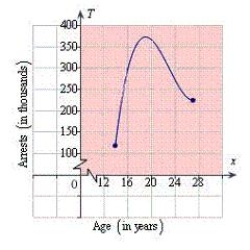
A) 15.7; 23.8
B) 18.2; 21.6
C) 16.7; 22.8
D) 15.7; 22.8
E) 16.7; 21.6
 ,
,  where x is the age in years (see figure). Approximate the two ages to one decimal place that had total arrests of 275 thousand.
where x is the age in years (see figure). Approximate the two ages to one decimal place that had total arrests of 275 thousand. 
A) 15.7; 23.8
B) 18.2; 21.6
C) 16.7; 22.8
D) 15.7; 22.8
E) 16.7; 21.6

Unlock Deck
Unlock for access to all 193 flashcards in this deck.
Unlock Deck
k this deck
37
Determine all values of x, (if any), at which the graph of the function has a horizontal tangent. 
A) and
and 
B)
C) and
and 
D)
E) The graph has no horizontal tangents.

A)
 and
and 
B)

C)
 and
and 
D)

E) The graph has no horizontal tangents.

Unlock Deck
Unlock for access to all 193 flashcards in this deck.
Unlock Deck
k this deck
38
Find the derivative of the function  .
.
A)
B)
C)
D)
E)
 .
. A)

B)

C)

D)

E)


Unlock Deck
Unlock for access to all 193 flashcards in this deck.
Unlock Deck
k this deck
39
Suppose that an automobile's velocity starting from rest is  where v is measured in feet per second. Find the acceleration at 7 seconds. Round your answer to one decimal place.
where v is measured in feet per second. Find the acceleration at 7 seconds. Round your answer to one decimal place.
A) 1.1 ft/sec2
B) 1.8 ft/sec2
C) 1.0 ft/sec2
D) 0.2 ft/sec2
E) 12.4 ft/sec2
 where v is measured in feet per second. Find the acceleration at 7 seconds. Round your answer to one decimal place.
where v is measured in feet per second. Find the acceleration at 7 seconds. Round your answer to one decimal place. A) 1.1 ft/sec2
B) 1.8 ft/sec2
C) 1.0 ft/sec2
D) 0.2 ft/sec2
E) 12.4 ft/sec2

Unlock Deck
Unlock for access to all 193 flashcards in this deck.
Unlock Deck
k this deck
40
The graph of the function f is given below. Select the graph of  .
. 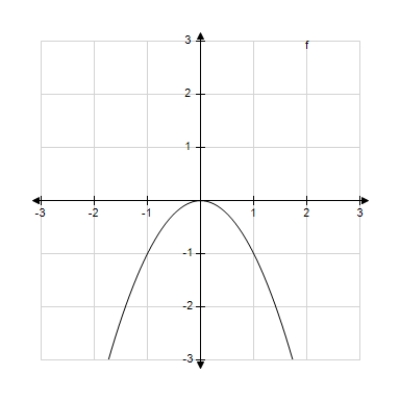
A) 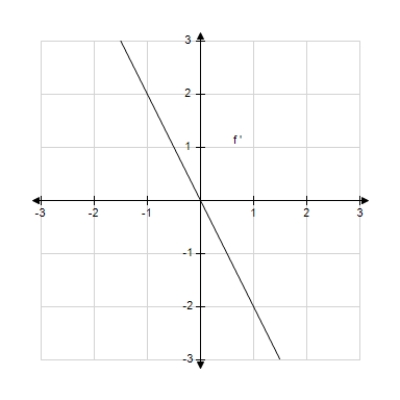
B) 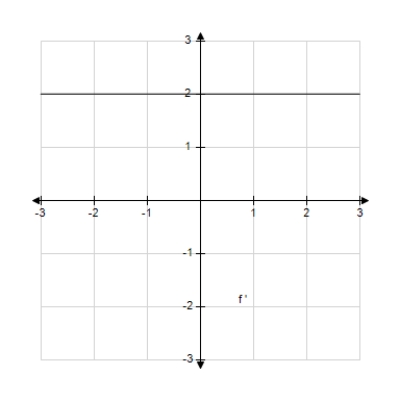
C) 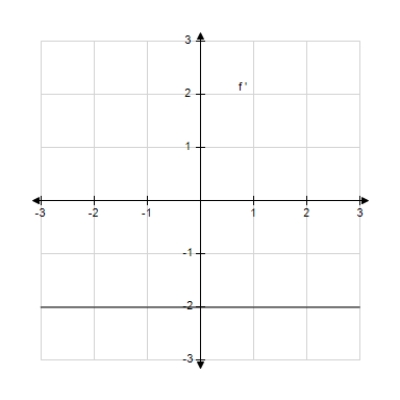
D) 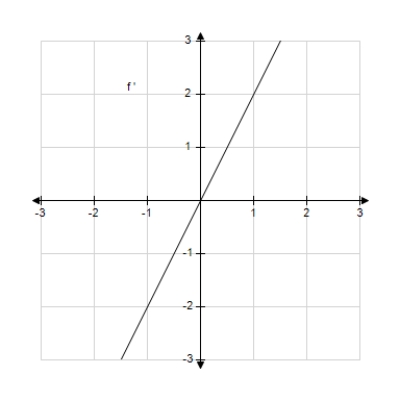
E) 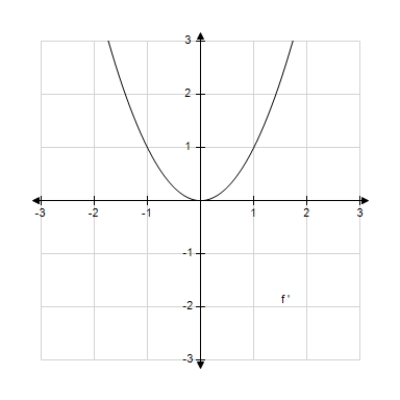
 .
. 
A)

B)

C)

D)

E)


Unlock Deck
Unlock for access to all 193 flashcards in this deck.
Unlock Deck
k this deck
41
Use logarithmic differentiation to find  .
. 
A)
B)
C)
D)
E)
 .
. 
A)

B)

C)

D)

E)


Unlock Deck
Unlock for access to all 193 flashcards in this deck.
Unlock Deck
k this deck
42
Find  by implicit differentiation.
by implicit differentiation. 
A)
B)
C)
D)
E)
 by implicit differentiation.
by implicit differentiation. 
A)

B)

C)

D)

E)


Unlock Deck
Unlock for access to all 193 flashcards in this deck.
Unlock Deck
k this deck
43
Suppose a 20-centimeter pendulum moves according to the equation  where
where  is the angular displacement from the vertical in radians and t is the time in seconds. Determine the rate of change of
is the angular displacement from the vertical in radians and t is the time in seconds. Determine the rate of change of  when
when  seconds. Round your answer to four decimal places.
seconds. Round your answer to four decimal places.
A) 1.669 radians per second
B) 2.7841 radians per second
C) 0.3815 radians per second
D) 1.8396 radians per second
E) 6.6763 radians per second
 where
where  is the angular displacement from the vertical in radians and t is the time in seconds. Determine the rate of change of
is the angular displacement from the vertical in radians and t is the time in seconds. Determine the rate of change of  when
when  seconds. Round your answer to four decimal places.
seconds. Round your answer to four decimal places. A) 1.669 radians per second
B) 2.7841 radians per second
C) 0.3815 radians per second
D) 1.8396 radians per second
E) 6.6763 radians per second

Unlock Deck
Unlock for access to all 193 flashcards in this deck.
Unlock Deck
k this deck
44
Find  by implicit differentiation.
by implicit differentiation. 
A)
B)
C)
D)
E)
 by implicit differentiation.
by implicit differentiation. 
A)

B)

C)

D)

E)


Unlock Deck
Unlock for access to all 193 flashcards in this deck.
Unlock Deck
k this deck
45
Find the slope of the graph of the function at the given value.  at
at 
A)
B)
C)
D)
E)
 at
at 
A)

B)

C)

D)

E)


Unlock Deck
Unlock for access to all 193 flashcards in this deck.
Unlock Deck
k this deck
46
Find the derivative of the function  . Simplify your answer.
. Simplify your answer.
A)
B)
C)
D)
E)
 . Simplify your answer.
. Simplify your answer. A)

B)

C)

D)

E)


Unlock Deck
Unlock for access to all 193 flashcards in this deck.
Unlock Deck
k this deck
47
Find the derivative of the function  .
.
A)
B)
C)
D)
E)
 .
. A)

B)

C)

D)

E)


Unlock Deck
Unlock for access to all 193 flashcards in this deck.
Unlock Deck
k this deck
48
Use logarithmic differentiation to find  .
. 
A)
B)
C)
D)
E)
 .
. 
A)

B)

C)

D)

E)


Unlock Deck
Unlock for access to all 193 flashcards in this deck.
Unlock Deck
k this deck
49
Find the slope of the graph of the function at the given value.  when
when 
A)
B)
C)
D)
E)
 when
when 
A)

B)

C)

D)

E)


Unlock Deck
Unlock for access to all 193 flashcards in this deck.
Unlock Deck
k this deck
50
Find  if
if  .
.
A)
B)
C)
D)
E)
 if
if  .
. A)

B)

C)

D)

E)


Unlock Deck
Unlock for access to all 193 flashcards in this deck.
Unlock Deck
k this deck
51
The ordering and transportation cost C for the components used in manufacturing a product is  ,
,  where C is measured in thousands of dollars and x is the order size in hundreds. Find the rate of change of C with respect to x for
where C is measured in thousands of dollars and x is the order size in hundreds. Find the rate of change of C with respect to x for  . Round your answer to two decimal places.
. Round your answer to two decimal places.
A) -6.20 thousand dollars per hundred
B) 7.41 thousand dollars per hundred
C) 3.13 thousand dollars per hundred
D) -5.03 thousand dollars per hundred
E) -8.02 thousand dollars per hundred
 ,
,  where C is measured in thousands of dollars and x is the order size in hundreds. Find the rate of change of C with respect to x for
where C is measured in thousands of dollars and x is the order size in hundreds. Find the rate of change of C with respect to x for  . Round your answer to two decimal places.
. Round your answer to two decimal places. A) -6.20 thousand dollars per hundred
B) 7.41 thousand dollars per hundred
C) 3.13 thousand dollars per hundred
D) -5.03 thousand dollars per hundred
E) -8.02 thousand dollars per hundred

Unlock Deck
Unlock for access to all 193 flashcards in this deck.
Unlock Deck
k this deck
52
Use the rules of differentiation to find the derivative of the function  .
.
A)
B)
C)
D)
E)
 .
. A)

B)

C)

D)

E)


Unlock Deck
Unlock for access to all 193 flashcards in this deck.
Unlock Deck
k this deck
53
A buoy oscillates in simple harmonic motion  as waves move past it. The buoy moves a total of
as waves move past it. The buoy moves a total of  feet (vertically) between its low point and its high point. It returns to its high point every
feet (vertically) between its low point and its high point. It returns to its high point every  seconds. Determine the velocity of the buoy as a function of t.
seconds. Determine the velocity of the buoy as a function of t.
A)
B)
C)
D)
E)
 as waves move past it. The buoy moves a total of
as waves move past it. The buoy moves a total of  feet (vertically) between its low point and its high point. It returns to its high point every
feet (vertically) between its low point and its high point. It returns to its high point every  seconds. Determine the velocity of the buoy as a function of t.
seconds. Determine the velocity of the buoy as a function of t. A)

B)

C)

D)

E)


Unlock Deck
Unlock for access to all 193 flashcards in this deck.
Unlock Deck
k this deck
54
All edges of a cube are expanding at a rate of 7 centimeters per second. How fast is the volume changing when each edge is 2 centimeters?
A)
B)
C)
D)
E)
A)

B)

C)

D)

E)


Unlock Deck
Unlock for access to all 193 flashcards in this deck.
Unlock Deck
k this deck
55
An airplane is flying in still air with an airspeed of 283 miles per hour. If it is climbing at an angle of 21°, find the rate at which it is gaining altitude. Round your answer to four decimal places.
A)
B)
C)
D)
E)
A)

B)

C)

D)

E)


Unlock Deck
Unlock for access to all 193 flashcards in this deck.
Unlock Deck
k this deck
56
Find the derivative of the function  .
.
A)
B)
C)
D)
E)
 .
. A)

B)

C)

D)

E)


Unlock Deck
Unlock for access to all 193 flashcards in this deck.
Unlock Deck
k this deck
57
In a free-fall experiment, an object is dropped from a height of 144 feet. A camera on the ground 500 feet from the point of impact records the fall of the object as shown in the figure. Assuming the object is released at time  . Find the rate of change of the angle of elevation of the camera when
. Find the rate of change of the angle of elevation of the camera when  . Round your answer to four decimal places.
. Round your answer to four decimal places. 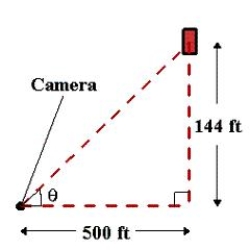
A)
B)
C)
D)
E)
 . Find the rate of change of the angle of elevation of the camera when
. Find the rate of change of the angle of elevation of the camera when  . Round your answer to four decimal places.
. Round your answer to four decimal places. 
A)

B)

C)

D)

E)


Unlock Deck
Unlock for access to all 193 flashcards in this deck.
Unlock Deck
k this deck
58
Find  by implicit differentiation.
by implicit differentiation.  .
.
A)
B)
C)
D)
E)
 by implicit differentiation.
by implicit differentiation.  .
.
A)

B)

C)

D)

E)


Unlock Deck
Unlock for access to all 193 flashcards in this deck.
Unlock Deck
k this deck
59
A petrol car is parked 40 feet from a long warehouse (see figure). The revolving light on top of the car turns at a rate of 30 revolutions per minute. Write  as a function of x.
as a function of x. 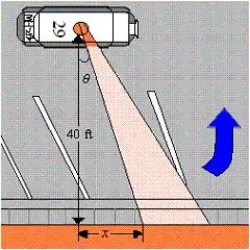
A)
B)
C)
D)
E)
 as a function of x.
as a function of x. 
A)

B)

C)

D)

E)


Unlock Deck
Unlock for access to all 193 flashcards in this deck.
Unlock Deck
k this deck
60
Determine all values of x, (if any), at which the graph of the function has a horizontal tangent. 
A)
B)
C) and
and 
D) and
and 
E) The graph has no horizontal tangents.

A)

B)

C)
 and
and 
D)
 and
and 
E) The graph has no horizontal tangents.

Unlock Deck
Unlock for access to all 193 flashcards in this deck.
Unlock Deck
k this deck
61
Find the rate of change of the distance D between the origin and a moving point on the graph of  if
if  centimeters per second.
centimeters per second.
A)
B)
C)
D)
E)
 if
if  centimeters per second.
centimeters per second. A)

B)

C)

D)

E)


Unlock Deck
Unlock for access to all 193 flashcards in this deck.
Unlock Deck
k this deck
62
Find the derivative of the function  .
.
A)
B)
C)
D)
E)
 .
. A)

B)

C)

D)

E)


Unlock Deck
Unlock for access to all 193 flashcards in this deck.
Unlock Deck
k this deck
63
Use the alternative form of the derivative to find the derivative of the function  at
at  .
.
A)
B)
C)
D)
E)
 at
at  .
. A)

B)

C)

D)

E)


Unlock Deck
Unlock for access to all 193 flashcards in this deck.
Unlock Deck
k this deck
64
Find the derivative of the function  .
.
A)
B)
C)
D)
E)
 .
. A)

B)

C)

D)

E)


Unlock Deck
Unlock for access to all 193 flashcards in this deck.
Unlock Deck
k this deck
65
Use implicit differentiation to find an equation of the tangent line to the ellipse  at
at  .
.
A)
B)
C)
D)
E)
 at
at  .
. A)

B)

C)

D)

E)


Unlock Deck
Unlock for access to all 193 flashcards in this deck.
Unlock Deck
k this deck
66
Find the slope-intercept equation of the line tangent to the graph of  when
when  .
.
A)
B)
C)
D)
E)
 when
when  .
. A)

B)

C)

D)

E)


Unlock Deck
Unlock for access to all 193 flashcards in this deck.
Unlock Deck
k this deck
67
Find the derivative of the algebraic function  .
.
A)
B)
C)
D)
E)
 .
. A)

B)

C)

D)

E)


Unlock Deck
Unlock for access to all 193 flashcards in this deck.
Unlock Deck
k this deck
68
Find an equation of the tangent line to the graph of f at the given point.  , at
, at 
A)
B)
C)
D)
E)
 , at
, at 
A)

B)

C)

D)

E)


Unlock Deck
Unlock for access to all 193 flashcards in this deck.
Unlock Deck
k this deck
69
Use the Quotient Rule to differentiate the function  .
.
A)
B)
C)
D)
E)
 .
. A)

B)

C)

D)

E)


Unlock Deck
Unlock for access to all 193 flashcards in this deck.
Unlock Deck
k this deck
70
Find  by implicit differentiation.
by implicit differentiation. 
A)
B)
C)
D)
E)
 by implicit differentiation.
by implicit differentiation. 
A)

B)

C)

D)

E)


Unlock Deck
Unlock for access to all 193 flashcards in this deck.
Unlock Deck
k this deck
71
A petrol car is parked 50 feet from a long warehouse (see figure). The revolving light on top of the car turns at a rate of 30 revolutions per minute. How fast is the light beam moving along the wall when the beam makes an angle of  with the perpendicular from the light to the wall.
with the perpendicular from the light to the wall. 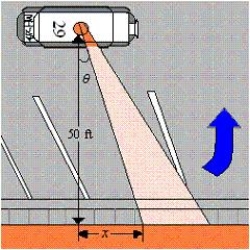
A)
B)
C)
D)
E)
 with the perpendicular from the light to the wall.
with the perpendicular from the light to the wall. 
A)

B)

C)

D)

E)


Unlock Deck
Unlock for access to all 193 flashcards in this deck.
Unlock Deck
k this deck
72
Determine all values of x, (if any), at which the graph of the function has a horizontal tangent. 
A)
B) and
and 
C) and
and 
D)
E) The graph has no horizontal tangents.

A)

B)
 and
and 
C)
 and
and 
D)

E) The graph has no horizontal tangents.

Unlock Deck
Unlock for access to all 193 flashcards in this deck.
Unlock Deck
k this deck
73
A projectile is shot upwards from the surface of the earth with an initial velocity of 122 meters per second. The position function is  .
.
What is its velocity after 3 seconds?
A) The velocity after 3 seconds is 229.3 meters per second.
B) The velocity after 3 seconds is -136.7 meters per second.
C) The velocity after 3 seconds is 92.6 meters per second.
D) The velocity after 3 seconds is 107.3 meters per second.
E) The velocity after 3 seconds is -151.4 meters per second
 .
. What is its velocity after 3 seconds?
A) The velocity after 3 seconds is 229.3 meters per second.
B) The velocity after 3 seconds is -136.7 meters per second.
C) The velocity after 3 seconds is 92.6 meters per second.
D) The velocity after 3 seconds is 107.3 meters per second.
E) The velocity after 3 seconds is -151.4 meters per second

Unlock Deck
Unlock for access to all 193 flashcards in this deck.
Unlock Deck
k this deck
74
Find the derivative of the function  .
.
A)
B)
C)
D)
E)
 .
. A)

B)

C)

D)

E)


Unlock Deck
Unlock for access to all 193 flashcards in this deck.
Unlock Deck
k this deck
75
Suppose the position function for a free-falling object on a certain planet is given by  . A silver coin is dropped from the top of a building that is 1,366 feet tall. Find the instantaneous velocity of the coin when
. A silver coin is dropped from the top of a building that is 1,366 feet tall. Find the instantaneous velocity of the coin when  .
.
A) -130 ft/sec
B) -34 ft/sec
C) -21 ft/sec
D) -195 ft/sec
E) -65 ft/sec
 . A silver coin is dropped from the top of a building that is 1,366 feet tall. Find the instantaneous velocity of the coin when
. A silver coin is dropped from the top of a building that is 1,366 feet tall. Find the instantaneous velocity of the coin when  .
. A) -130 ft/sec
B) -34 ft/sec
C) -21 ft/sec
D) -195 ft/sec
E) -65 ft/sec

Unlock Deck
Unlock for access to all 193 flashcards in this deck.
Unlock Deck
k this deck
76
Complete two iterations of Newton's Method to approximate a zero of the function using the given initial guess. What is the value of  of such an approximation? Round your answer to 5 decimal places.
of such an approximation? Round your answer to 5 decimal places.  ,
, 
A) 85.42370
B) 78.37037
C) 86.20741
D) 86.99111
 of such an approximation? Round your answer to 5 decimal places.
of such an approximation? Round your answer to 5 decimal places.  ,
, 
A) 85.42370
B) 78.37037
C) 86.20741
D) 86.99111

Unlock Deck
Unlock for access to all 193 flashcards in this deck.
Unlock Deck
k this deck
77
Find the derivative of the function  .
.
A)
B)
C)
D)
E)
 .
. A)

B)

C)

D)

E)


Unlock Deck
Unlock for access to all 193 flashcards in this deck.
Unlock Deck
k this deck
78
Find the points at which the graph of the equation has a vertical or horizontal tangent line. 
A) There is a vertical tangent at but no horizontal tangents.
but no horizontal tangents.
B) There is a horizontal tangent at and a vertical tangent at
and a vertical tangent at  .
.
C) There is a horizontal tangent at but no vertical tangents.
but no vertical tangents.
D) There is a horizontal tangent at and a vertical tangent at
and a vertical tangent at  .
.
E) There are no horizontal or vertical tangent lines.

A) There is a vertical tangent at
 but no horizontal tangents.
but no horizontal tangents.B) There is a horizontal tangent at
 and a vertical tangent at
and a vertical tangent at  .
.C) There is a horizontal tangent at
 but no vertical tangents.
but no vertical tangents.D) There is a horizontal tangent at
 and a vertical tangent at
and a vertical tangent at  .
.E) There are no horizontal or vertical tangent lines.

Unlock Deck
Unlock for access to all 193 flashcards in this deck.
Unlock Deck
k this deck
79
Find the derivative of the function. 
A)
B)
C)
D)
E)

A)

B)

C)

D)

E)


Unlock Deck
Unlock for access to all 193 flashcards in this deck.
Unlock Deck
k this deck
80
Find  if
if  .
.
A)
B)
C)
D)
E)
 if
if  .
. A)

B)

C)

D)

E)


Unlock Deck
Unlock for access to all 193 flashcards in this deck.
Unlock Deck
k this deck


